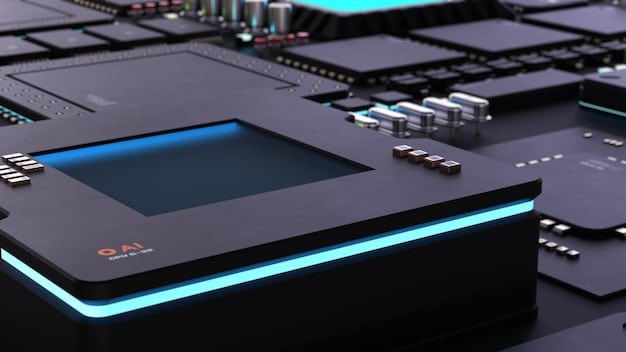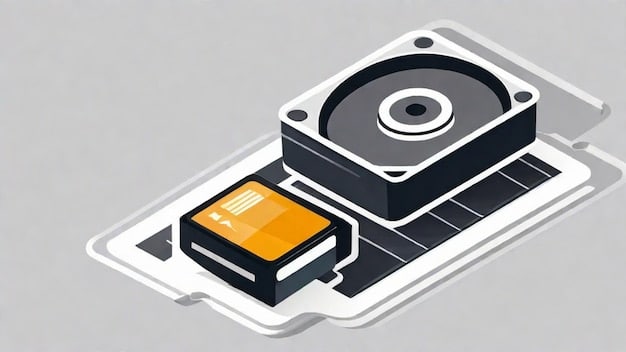Unlock Speed: SSD Benefits for Your Computer in 2024

Anúncios
Solid-state drives (SSDs) significantly boost computer performance by offering faster data access, quicker boot times, increased durability, and improved energy efficiency compared to traditional hard disk drives, making them a worthwhile upgrade in 2024.
Considering upgrading your computer’s storage? The answer is clear: a solid-state drive (SSD). Let’s explore what are the benefits of switching to a solid-state drive (SSD) for your computer in 2024? and why it’s a must-do for any computer user.
Anúncios
What Makes SSDs Different From HDDs?
Understanding the difference between SSDs and HDDs is crucial before diving into the benefits. Unlike traditional hard disk drives (HDDs) that use spinning platters and a read/write head to access data, SSDs use flash memory to store data.
This fundamental difference in technology leads to significant performance advantages.
Anúncios
The Technology Behind HDDs
HDDs store data on rotating magnetic platters. A mechanical arm moves a read/write head across these platters to access the data. This mechanical process is inherently slower and more prone to failures.
The Technology Behind SSDs
SSDs, on the other hand, use NAND flash memory to store data. This is the same type of memory used in USB drives and memory cards. Because there are no moving parts, SSDs can access data much faster.

In essence, like comparing between reading a book versus retrieving files from a filing cabinet. Let’s look at performance boost in details.
In conclusion, the change from mechanical HDDs to electrical SSDs made a big difference in how well computers work now.
Experience Lightning-Fast Boot Times
One of the most noticeable benefits of switching to an SSD is the dramatically reduced boot time. Waiting for your computer to start up can be frustrating. With an SSD, those frustrating waits are gone.
SSDs can boot operating systems in a fraction of the time it takes with HDDs.
Boot Time Comparison
Typically, a computer with an HDD might take 30 seconds to a minute or more to boot up. An SSD, however, can boot the same system in as little as 10-15 seconds. This means less waiting and more doing.
Impact on Daily Workflow
This speed improvement isn’t just about booting up faster. It affects your entire workflow. Applications launch quicker, files open faster, and the overall responsiveness of your system improves.
Consider the number of times you restart your computer in a day. All those times add up, and make your device snappy and responsive by using SSD.
To conclude, the faster boot times afforded by SSDs translate to significant time savings and a more efficient computing experience, and is a practical solution to optimize your experience on the device.
Enjoy Faster Application Loading
Beyond boot times, SSDs significantly accelerate application loading speeds. Whether you’re launching a web browser, a word processor, or a graphics-intensive application, SSDs make the process much faster.
This benefit stems directly from the faster read and write speeds of SSDs.
- Reduced Waiting Times: Applications load almost instantly, reducing the amount of time you spend waiting.
- Improved Productivity: Faster loading times allow you to jump into your tasks more quickly, boosting your overall productivity.
- Seamless Multitasking: With applications loading faster, multitasking becomes smoother and more efficient.
The ability to load applications nearly instantly transforms the computing experience. It makes everything feel more responsive and fluid, whether you’re working, creating, or playing.
In essence, SSDs provides fast application loading capability, and allow you to execute your tasks more effectively.
Experience Improved System Responsiveness
SSDs don’t just improve boot and loading times; they also enhance the overall responsiveness of your system. Every click, every command, and every interaction feels snappier and more immediate.
This responsiveness is especially noticeable when multitasking or working with large files.

Faster File Access
SSDs can access files much faster than HDDs, whether you’re opening a document, editing a photo, or transferring files, the speed difference is palpable. This is particularly useful for professionals who work with large files regularly.
Smooth Multitasking
With an SSD, switching between applications is much smoother. You won’t experience the slowdowns and delays that are common with HDDs. This makes multitasking more efficient and less frustrating.
Overall improved system responsiveness is one of the most appreciated benefits of SSDs.
In short, the speed and responsiveness of SSDs give an edge in completing the tasks while you’re on the move.
Enhance Durability and Reliability
SSDs are inherently more durable and reliable than HDDs due to their lack of moving parts. This makes them better suited for laptops and other portable devices that are more prone to bumps and drops.
The absence of mechanical components also means that SSDs are less susceptible to mechanical failures.
Resistance to Physical Shock
HDDs are vulnerable to physical shock because their read/write heads can crash into the platters if the drive is dropped or bumped. SSDs, however, can withstand much greater impacts without suffering damage.
Lower Risk of Data Loss
The enhanced durability of SSDs translates to a lower risk of data loss. This is especially important for those who rely on their computers for critical tasks.
In any case, the enhanced durability of SSDs provides better long term usage.
In conclusion, the robust design and reliability of SSDs offer peace of mind, knowing that your data is safer and more secure.
Reduce Power Consumption and Increase Battery Life
SSDs consume significantly less power compared to HDDs. This is particularly beneficial for laptops, where it can lead to increased battery life. When you use SSD, it can help to extend your device battery life.
The power savings come from the fact that SSDs don’t have any moving parts that require energy to operate.
- Lower Energy Consumption: SSDs use less energy than HDDs, reducing your computer’s overall power consumption.
- Extended Battery Life: For laptops, the reduced power consumption translates to longer battery life, allowing you to work or play for longer periods without needing to plug in.
- Cooler Operation: Because SSDs consume less power, they also generate less heat, which can help to keep your computer running cooler.
For these reasons, SSDs are not only an environment-friendly as it consumes less power, the increase in battery life is also very beneficial for users.
To sum up, the enhanced battery time gives you freedom to continue to execute tasks uninterrupted.
Consider the Cost-Effectiveness Over Time
While SSDs may have a higher upfront cost compared to HDDs, their long-term benefits can make them more cost-effective over time. The increased speed, durability, and energy efficiency can lead to significant savings. Especially in todays world, cost reductions in production is becoming a common thing.
The longevity and reliability of SSDs can reduce the need for frequent replacements.
Reduced Maintenance Costs
Because SSDs are less prone to mechanical failures, they require less maintenance than HDDs. This can save you money on repairs and replacements over the long term.
Increased Productivity
The increased speed and responsiveness of SSDs can boost your productivity, allowing you to complete tasks faster and more efficiently. This can translate to financial gains, especially for freelancers and professionals.
However, we also have to be wary, cheaper SSDs usually comes with reduced performance, so it may be worth it to pay slightly more for a better one.
Therefore, investing in an SSD is an investment in the long-term performance and reliability of your computer, making it a smart choice for anyone looking to maximize their computing experience.
| Key Benefit | Brief Description |
|---|---|
| 🚀 Faster Boot Times | Quicker startup, less waiting. |
| ⚡ Application Speed | Applications load almost instantly. |
| 🛡️ Enhanced Durability | More resistant to physical shock. |
| 🔋 Increased Battery Life | Reduced power consumption for laptops. |
Frequently Asked Questions
▼
SSDs can be several times faster than HDDs. In real-world use, this translates to much quicker boot times and application loading. You’ll experience significantly less waiting time.
▼
Installing an SSD is generally straightforward and similar to installing an HDD. There are many tutorials available online which can help you through the process. Make you also have the right tools to execute on the task.
▼
Yes, because SSDs consume less power than HDDs, they generate less heat. This can help to keep your computer running cooler and reduce the risk of overheating, especially in laptops.
▼
SSDs have a limited number of write cycles, but modern SSDs are very durable and can last for many years under normal use. Most SSDs come with warranty for 3-5 years.
▼
Yes, SSDs are great as external drives. They are fast and durable. You can purchase an external enclosure or adapter to connect the SSD to your computer for use as an external drive.
Conclusion
Switching to an SSD in 2024 offers numerous benefits, including faster boot times, quicker application loading, improved system responsiveness, enhanced durability, reduced power consumption, and long-term cost-effectiveness. It’s a smart upgrade that can significantly improve your overall computing experience.





